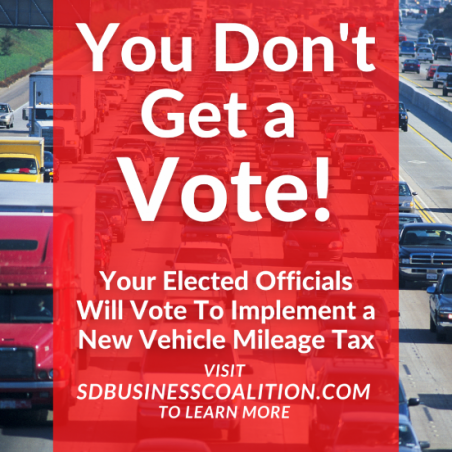 East County News Service
East County News Service
September 30, 2021 (San Diego) – The San Diego Association of Governments (SANDAG) is considering a proposal to tax drivers for every mile driven. SANDAG leaders say the plan would help fund future transportation needs and encourage use of mass transit. But opponents say it unfairly penalizes motorists in areas such as East County, where many communities lack access to mass transit and drivers have no choice but to commute long distances to work, shop, or attend college.
In 2021, 18 Chambers of Commerce came together to form the San Diego Business Coalition. Their goal is to educate the community and businesses about proposed policies that could negatively impact San Diegans. The coalition includes the Alpine, La Mesa, Lakeside, Poway, and East County Chambers of Commerce in our region’s inland areas, as well as chambers in San Diego, North County and the South Bay.
The proposed pilot program would then be implemented for all California drivers, the coalition says. Specifically:
- 80-cent-per-gallon increase - The Vehicle Mileage Tax would require tracking every driver's mileage and charging them $0.04-$0.06 per mile they drive. That is the equivalent of an $0.80 per gallon increase in gas tax.
- $600-800 a year - The typical San Diegan driver will be forced to pay $600-800 more a year to drive on roads they already paid for with the original gas and sales taxes. When added with the current car and gas tax, a two-car family is looking at over $3,000 a year in taxes.
- Loss of privacy - The Mileage Tax is an invasion of privacy with a tracking requirement that is still being decided by the government. Proposals include a device installed in every vehicle, a tracking app on cell phones, or your odometer being inspected annually.
The San Diego Business Coalition interviewed San Diego Association of Governments (SANDAG) with pointed questions on the proposed plan. Get details at https://sdbusinesscoalition.com/sandag-regional-plan-update-video/.
The Coalition has also set up a page for residents to voice opposition to the proposed tax and links to contact your representatives on SANDAG:
https://sdbusinesscoalition.com/take-the-pledge/







Comments
do not know
there is a fair way much easier than a mileage tax
ps there are even more ways